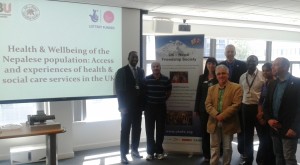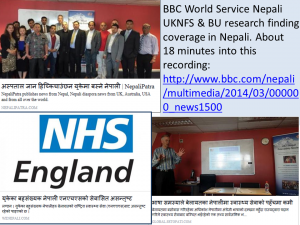
BU and UKNFS jointly presented some of the key findings of their study into the UK’s Nepali community. The meeting (22 July) in the EBC was attended by local representatives of the NHS, the CCG and Healthwatch Dorset. BU Prof. Vanora Hundley, Deputy Dean for Research (FHSS), who herself has published several academic paper on Nepal or English-language academic journals in Nepal, welcomed the audience. She highlighted how the research fitted into the wider health and soial care research portfolio of the Faculty.
BU Prof. Edwin van Teijlingen’s presentation highlighted the issues of access the health and social services in growing Nepali community in the UK. The reports highlights health and lifestyle issues, help-seeking behaviour and the influence of culture on health-related decision making. He mentioned barriers such as language and knowledge about services (or lack thereof). The findings of this study relate to previous studies in the field of ethnic minority communities int he UK. Mr. Alan Mercel-Sanca, Chairperson of the UK Nepal Friendship Society thanked the key researchers Dr. Bibha Simkhada (BU VIsiting Faculty) and Dr. Rajeeb Kumar Sah for conducting this mixed-methods research to such a high standard. He also thanked the Big Lottery Fund for making this ground-breaking piece of work possible, and the NHS England Equality and Health Inequalities team for their interest in final report and advice on the research.
The Report offers a unique opportunity for local health crae providers and commissioners to improve their understanding of this particular ethnic minority group. In the long run the report may lead to more effectively service delivery, especially in terms of health and social services that are sensitive to the needs of the Nepali community. Moreover, the report’s findings have direct relevance to other So uth Asian and broader Black & Minority Ethnic (BME) communities in the UK.
uth Asian and broader Black & Minority Ethnic (BME) communities in the UK.
Finally, the audience heard how the report has been widely reported among the Nepali-language media to the Nepali community in the UK as well as in Nepal. This include coverage by the BBC World Service in Nepali, who interviewed Dr. Bibha Simkhada about the study.
The report is available online here!
Prof. Edwin van Teijlingen
CMMPH
 Research dissemination event in Kathmandu
Research dissemination event in Kathmandu Nepali migrant workers in India #GlobalFoL17 presentation in Delhi
Nepali migrant workers in India #GlobalFoL17 presentation in Delhi










 Beyond Academia: Exploring Career Options for Early Career Researchers – Online Workshop
Beyond Academia: Exploring Career Options for Early Career Researchers – Online Workshop UKCGE Recognised Research Supervision Programme: Deadline Approaching
UKCGE Recognised Research Supervision Programme: Deadline Approaching SPROUT: From Sustainable Research to Sustainable Research Lives
SPROUT: From Sustainable Research to Sustainable Research Lives BRIAN upgrade and new look
BRIAN upgrade and new look Seeing the fruits of your labour in Bangladesh
Seeing the fruits of your labour in Bangladesh ECR Funding Open Call: Research Culture & Community Grant – Apply now
ECR Funding Open Call: Research Culture & Community Grant – Apply now ECR Funding Open Call: Research Culture & Community Grant – Application Deadline Friday 12 December
ECR Funding Open Call: Research Culture & Community Grant – Application Deadline Friday 12 December MSCA Postdoctoral Fellowships 2025 Call
MSCA Postdoctoral Fellowships 2025 Call ERC Advanced Grant 2025 Webinar
ERC Advanced Grant 2025 Webinar Update on UKRO services
Update on UKRO services European research project exploring use of ‘virtual twins’ to better manage metabolic associated fatty liver disease
European research project exploring use of ‘virtual twins’ to better manage metabolic associated fatty liver disease